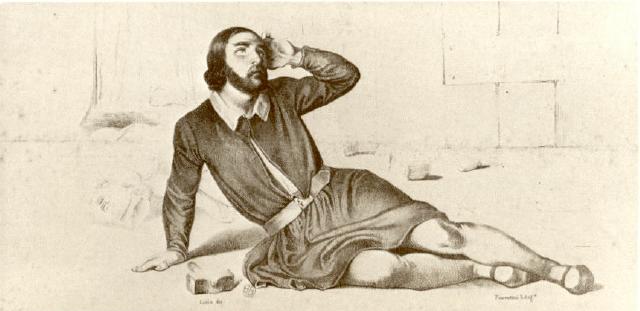Napoleone Moriani
He made his debut in 1832 in concert, but at La Scala. His stage debut followed in 1833 in Pavia, in Gli arabi nelle Gallie by
Pacini. He was an immediate success; still in 1833, he sang in Padova and Parma, in 1834 in Parma, Torino and Genova, in 1835 in Genova
and Naples, in 1836 in Naples, Bologna, Livorno and his native Florence, in 1837 in Bologna, Florence, Faenza, Lucca, Senigallia and
Venice, in 1838 in Rome, Venice, Florence, Lucca, Livorno and Senigallia, in 1839 on the stage of La Scala in Milano, in Venice, Lucca,
Senigallia and Trieste.
He was a sensation above all in Donizetti (particularly as Edgardo, Gennaro, Ghino and Percy), but also in Mercadante, Bellini, and in
lot of works of lots of totally forgotten belcanto composers; just Rossini played almost no role for his repertory. Moriani was a
captivating stage actor, and particularly famous for his death scenes (like in Pia de' Tolomei).
In 1840, he appeared abroad for the first time, in Vienna (Kärntnertortheater); other than that, he sang that year again at La Scala
and Trieste; in 1841 in Venice, Milano, Florence, Bologna, Vienna, Dresden and Verona, in 1842 in Venice, Vienna and Dresden, in 1843 in
Rome, Reggio Emilia, Budapest, Vienna, Dresden, Berlin and Hamburg, in 1844 in Vienna, Madrid and London (Her Majesty's Theater), in 1845
in London (both at Drury Lane and Her Majesty's), Madrid, Barcelona and Paris (Théâtre Italien), in 1846 in Lisbon, Bergamo,
Madrid and at La Scala, in Venice at the Teatro Apollo, in 1847 in Milano (both at La Scala and at the Carcano), in Senigallia, Bologna
and Faenza. He found now his most successful and legendary role, Luigi Rolla in the opera of the same name by Federico Ricci (reportedly a
really good opera, which was however so connected with Moriani that it disappeared from the repertory after the end of Moriani's career).
And he sang now also a lot of Verdi. His and Verdi's private relationship was an interesting one; Moriani had been the domestic partner of
soprano Giuseppina Strepponi for many years, they had two children. When Strepponi became the defacto (and later the official wife) of
Giuseppe Verdi, however, that didn't affect the friendship between Moriani and Verdi in any form, and Moriani continued to star in
Verdi's early operas.
1847 was the year Moriani got into serious vocal trouble: he had obviously overstrained his instrument. His career was now, all of
a sudden, practically over. He made a few unsuccessful comeback attempts, in 1848 in Florence and Lucca, in 1849 and 1850 at the
Théâtre Italien, and in 1851 in Naples. He finished his career again in concert, in Rouen in 1851.
Coccia, Carlo
Coen, Carlo
Donizetti, Gaetano
Lillo, Giuseppe
Marliani, Marco Aurelio
Mercadante, Saverio
Nicolai, Otto
Pacini, Giovanni
Peri, Achille
Persiani, Giuseppe
Ricci, Federico
Ricci, Luigi
Rossi, Lauro
Rossini, Gioacchino
Savi, Luigi
Solera,Temistocle (yes indeed, he also composed music!)
Uccelli, Carolina
Vaccai, Nicola
Verdi, Giuseppe
Reference 1: Treccani, Dizionario biografico degli italiani, vol. 76, Roma 2012; reference 2; reference 3: Kutsch & Riemens
|
